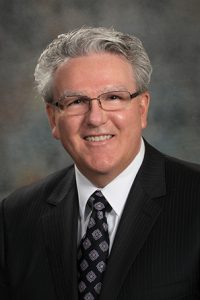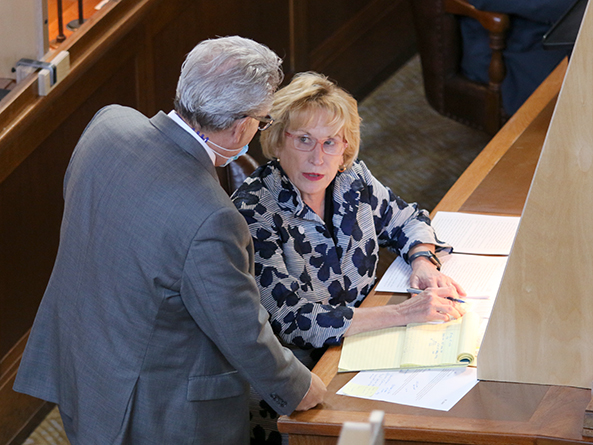Last-minute tax package advances after cloture vote
Lawmakers gave first-round approval Aug. 5 to a bill combining several major tax proposals.
As introduced by Norfolk Sen. Jim Scheer, LB1107 would make a technical change to state law related to the assessment of real property.
A Revenue Committee amendment, adopted 44-2, would replace the bill with numerous provisions, including a proposal to create a new tax credit based on the amount of property taxes paid to a taxpayer’s school district, establish a new business tax incentive program and commit funds to a potential project at the University of Nebraska Medical Center.
Scheer supported the proposal, calling it “an opportunity to move this state forward for all of our citizens.” By making Nebraska more inviting to businesses, he said, LB1107 would create new jobs and increase the state’s population, reducing taxes on homeowners, farmers and businesses.
“I don’t necessarily love incentives—no one does,” Scheer said. “But we’re naive to think that we don’t have to have anything in order to attract new business.”
Nebraska Property Tax Incentive Act
The previous committee proposal, contained in an amendment to Scheer’s LB1106, would have reduced property valuations for school tax purposes over three years—thereby reducing the amount of property taxes they collect—while simultaneously increasing state aid to schools.
The new proposal would create a refundable income tax credit based on the amount an eligible taxpayer paid in property taxes to their school district during the previous year, not including those amounts levied for bonded indebtedness or a levy override.
The credit, which would be allowed to each individual, business or other entity that pays school district taxes, would be equal to a percentage set by the state Department of Revenue multiplied by the amount of school district taxes paid by the taxpayer during the taxable year.
For calendar year 2020, the department would set the percentage so that the total amount of credits is $125 million.
Sen. Lou Ann Linehan, the committee’s chairperson, said that for the following three years the amount of credits would increase based on growth in the state’s net tax receipts and the level of its cash reserve.
For 2024, the credit cap would be $375 million. For each year after that, the department would set the percentage so that the total amount of credits would be $375 million plus an amount equal to the growth in total assessed value for all real property from the prior year to the current year.
Linehan introduced an amendment to the committee amendment that would transfer $30 million from the cash reserve to the state’s general fund to offset the proposal’s cost. It would prohibit any further transfer to fulfill the act’s obligations until the cash reserve’s balance is $500 million or more. Senators voted 42-0 to adopt the amendment.
Linehan said Sen. John Stinner of Gering, chairperson of the Appropriations Committee, insisted on the amendment to ensure that the proposal would not direct any money in the state’s “rainy day fund” to meet the new property tax credit program’s obligations before the cash balance reaches the required threshold.
Stinner supported the proposal. He said Linehan’s amendment would set fiscal “guardrails” to ensure that the proposed property tax relief is funded through growth in state tax receipts, not by making “major league” cuts to government programs.
Lincoln Sen. Kate Bolz said she would vote to advance the bill from general file provided those guardrails were included, but she cautioned lawmakers about the proposal’s effect on the budget in future years as the global economy recovers from the coronavirus pandemic.
“I am optimistic,” she said, “but it is possible that we will not be able—in a fiscally responsible way—to keep up with the demands of this bill.”
The committee amendment also includes the provisions of LB930, introduced by Sen. Tom Briese of Albion.
Under those provisions, the state would grant $275 million in credits each year under the Property Tax Credit Relief Act, which uses state sales and income tax revenue to provide Nebraskans with credits meant to offset part of what they pay in local property taxes.
Any amount transferred or credited to the Property Tax Credit Cash Fund pursuant to any other state law would be added to the minimum amount when determining the total amount of relief granted under the act.
Breise supported the committee proposal, calling it “the package deal that we’ve all been working towards.” He said it would provide relief to every Nebraska property taxpayer and help grow the state’s economy.
North Platte Sen. Mike Groene said he would not vote to advance the bill from general file. He said the property tax relief proposal, like the existing property tax credit, would not keep up with increases in property tax collections because it does not control government spending.
“This is peanuts thrown to the gallery,” Groene said.
Sen. Steve Erdman of Bayard said the proposed credit would result in a “miniscule, unrecognizable amount of reduction in your taxes.”
“[LB]1107 is not property tax relief,” he said.
ImagiNE Nebraska Act
Also included in the committee amendment is a proposal to create a new business tax incentive program, the ImagiNE Nebraska Act. The application period for the state’s current program, the Nebraska Advantage Act, ends this year.
Sen. Mark Kolterman of Seward introduced the original proposal, LB720, last session. Under the committee amendment, qualifying businesses would receive a varying combination of incentives based on their level of capital investment and the number of employees they hire at a minimum qualifying wage.
Under Linehan’s amendment, the director of the state Department of Economic Development could not approve applications that would include refunds or credits for a calendar year in which a “base authority” is projected to be exceeded. The committee amendment would have allowed the director to exceed that base authority with the governor’s approval.
Under the committee amendment, the base authority would be $25 million in calendar years 2021 and 2022, $100 million for 2023 and 2024 and $150 million for 2025.
Beginning in 2026, the director would adjust the base authority every three years to an amount equal to three percent of the state’s general fund net receipts for the most recent fiscal year. Unused base authority would carry forward to the following year, but base authority prior to 2026 could not exceed $400 million.
Omaha Sen. Machaela Cavanaugh said she was disappointed that the Legislature was considering three major proposals in a single package rather than debating and voting on them individually.
She said she would like to support the new business tax incentive program because the business community feels it is important.
“But I will not support [a] tax incentive package that subsidizes companies that do not pay a living wage, do not pay benefits, do not pay leave to their employees,” Cavanaugh said. “Businesses that are getting tax incentives should be the best of the best.”
Nebraska Transformational Projects Act
The committee amendment also includes the amended provisions of Kolterman’s LB1084, which would require the state to provide $300 million in matching funds for a potential $1.6 billion academic hospital and all-hazards disaster response facility at the University of Nebraska Medical Center.
Kolterman, who supported the committee’s proposal, said the project could create 32,000 construction jobs and 8,800 permanent jobs once completed.
“I don’t know where you get a better return on your investment,” he said.
Under the new proposal, the state would provide no matching funds unless the applicant has been selected for participation in the federal program and $1.3 billion in federal funds and private donations have been received. In no case would matching funds be transferred before fiscal year 2025-26 or before the total amount of credits granted annually under the Nebraska Property Tax Incentive Act reaches $375 million.
After several hours of general file debate, Scheer offered a motion to invoke cloture, which ceases debate and forces a vote on a bill. The motion succeeded on a vote of 41-2. Thirty-three votes were needed.
Senators then voted 43-2 to advance LB1107 to select file.


